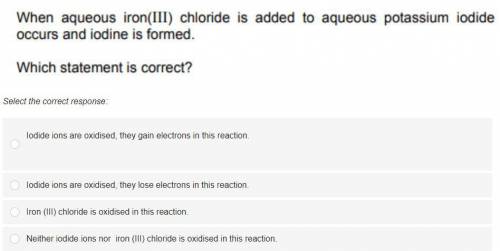
Chemistry, 21.02.2021 15:10 PencilLover101
When aqueous iron(III) chloride is added to aqueous potassium iodide occurs and iodine is formed.
Which statement is correct?
a. lodide ions are oxidised, they gain electrons in this reaction.
b. Neither iodide ions nor iron (III) chloride is oxidised in this reaction.
c. lodide ions are oxidised, they lose electrons in this reaction.
d. Iron (III) chloride is oxidised in this reaction.


Answers: 3


Another question on Chemistry

Chemistry, 21.06.2019 22:00
Which produce would best increase the amount of heat energy that is actually gained by calorimeter b
Answers: 1

Chemistry, 22.06.2019 05:00
Choose all the answers that apply. ionic compounds dissolve easily in water do not dissolve in water have low melting points have high melting points conduct electricity when melted
Answers: 1

Chemistry, 22.06.2019 10:00
Which sentence about particles in matter is true? a. atoms are present in solids and liquids but not in gases. b. the particles of matter are in constant motion. c. the same kinds of atoms are found in different elements. d. when a solid changes to a liquid, the sizes of the particles change.
Answers: 1

You know the right answer?
When aqueous iron(III) chloride is added to aqueous potassium iodide occurs and iodine is formed.
W...
Questions








Mathematics, 21.05.2021 17:40






Spanish, 21.05.2021 17:40


Mathematics, 21.05.2021 17:40

Mathematics, 21.05.2021 17:40


English, 21.05.2021 17:40



